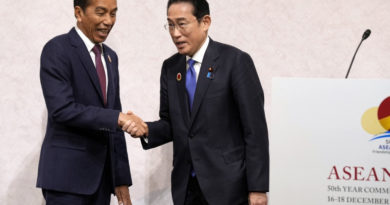OP ED-OPINION | SCI-TECH-AI | ChatGPT: Unleashing power of AI
AI can offer significant benefits to both individuals and organisations. – REUTERSPIC
.
“Adopting and utilising AI technology will enable individuals and organisations to remain competitive. We can access information instantly and leverage virtual assistants to automate our routine work.
SINCE the beginning of 2023, the introduction of Artificial Intelligence (AI) tools, including ChatGPT and other large language models (LLMs), has brought forth immense possibilities for people. These LLMs have the potential to revolutionise various aspects of our lives, spanning healthcare, finance, education, transportation and more.
.
Users of LLMs have been actively engaging in virtual forums and social media platforms, sharing innovative and entrepreneurial concepts. These discussions encompass a wide spectrum of ideas, ranging from the creation of AI-generated children’s storybooks to collaborative coding practices, incorporating LLMs into new software systems and generating innovative business ideas.
Just as Johannes Gutenberg’s invention of the printing press in the 15th century made literature and literacy more accessible, thereby advancing humanity and civilisation during the Renaissance, similarly, LLMs have the potential to improve decentralised learning.
By enabling inquisitive individuals to fully leverage knowledge and automation, LLMs can facilitate the creation of societal value.
Some fear the adoption of AI tools will result in job displacement. However, it is worth noting that throughout history, the introduction of transformative technologies, such as calculators and computers, initially resulted in job losses, such as those of typists and switchboard operators. Nevertheless, these advancements ultimately paved the way for the creation of new employment opportunities as technology enhanced efficiency and productivity.
The implementation of a contemporary point-of-sales system in a retail store or restaurant has rendered several jobs obsolete. However, the utilisation of such technology has significantly improved productivity and efficiency by facilitating data collection, streamlining accounting processes and managing inventory in real time.
Consequently, retail owners have gained better control over their businesses. With this in mind, I firmly believe that AI will serve as a catalyst for fostering future opportunities and driving economic growth.
For Malaysia to progress further, I recommend the following:
1. Adopt AI with an open heart
Adopting and utilising AI technology will enable individuals and organisations to remain competitive. By educating ourselves on AI technologies, we can access information instantly and leverage virtual assistants to automate our routine work. This, in turn, will free up our creative minds to innovate and generate new ideas for the future.
2. Promote use of AI tools
Since ChatGPT was introduced, I have encouraged my family and friends to embrace it. Interestingly, youngsters have adapted well to it while older users need motivation, encouragement and assistance to use AI tools. As a community, we need programmes to keep everyone informed on the advancement of technology. This way, we can bridge the technological divide in society and ensure that it does not become too wide.
3. Improve internet access
The disparity in internet access between rural and urban areas poses a notable obstacle to the widespread adoption of AI, particularly for individuals residing in rural areas. Since the use of LLMs and other AI products relies heavily on data, internet availability becomes a critical factor. The limited internet access in rural areas will impede the adoption of AI, leading to an educational gap between rural and urban communities. Urban students will have the opportunity to engage in personalised learning through AI tools while their rural counterparts will be deprived of such access. Consequently, it is imperative to address this disparity and ensure that the benefits of AI are accessible to all individuals, regardless of their geographic location.
4. Innovate with AI tools
The integration of AI tools will offer significant benefits to both individuals and organisations. AI can help businesses make data-driven decisions, automate repetitive tasks and enhance customer experience. Similarly, individuals can use AI tools for personal productivity, such as language translation or predictive text. Those who adopt AI tools will be rewarded proportionally as they will have access to better opportunities, increased efficiency and improved decision-making capabilities.
Conversely, individuals who do not embrace AI risk being left behind as they will not have access to the benefits of technology. This gap will exacerbate existing inequalities, such as disparities in income or education levels. The adoption of AI should be accessible to all, regardless of their socioeconomic backgrounds. Achieving this goal necessitates the implementation of policies that promote AI and the provision of education and training opportunities to individuals and organisations.
5. Address ethical concerns
With the increasing use of AI, it is imperative to confront ethical concerns associated with it, including algorithmic biases, privacy issues and data security. It is essential to ensure that AI is developed and used ethically and responsibly, with proper regulations and guidelines in place. Such measures will not only ensure the protection of individual rights and privacy but also build trust among users and stakeholders.
Just as the printing press unlocked new opportunities and propelled civilisation forward, the adoption of AI promises the same. However, it is crucial to address the challenges and considerations associated with its adoption, such as job displacement, internet access inequality, ethical concerns and the need for innovation and education.
By addressing these issues and ensuring that the adoption of AI is equitable, ethical and sustainable, Malaysia can leverage the benefits of this transformative technology and propel forward into a more innovative and prosperous future.
The writer is a Senior Fellow at Pacific Research Centre. Comments: [email protected]



 Memento Maxima Digital Marketing
Memento Maxima Digital Marketing
 Ads by: Memento Maxima Digital Marketing
Ads by: Memento Maxima Digital Marketing






